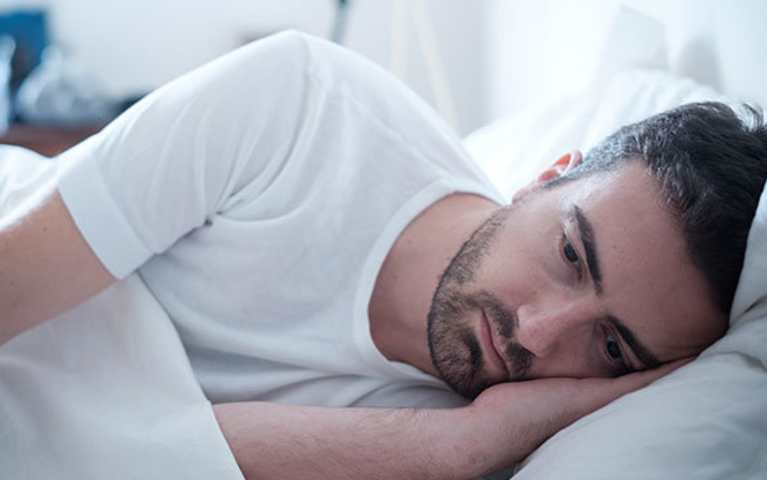Spending most of your nights tossing and turning, or staring at the ceiling? You're not alone. Quality sleep at midlife is elusive for many adults.
According to the Centers for Disease Control and Prevention (CDC), adults in midlife and beyond should continue to get 7 to 8 hours of sleep per night. Yet a full night's sleep is but a fantasy for many. The CDC says 10% of Americans – approximately 30 million people – are affected by chronic insomnia, or difficulty falling or staying asleep for 30 days in a row or more. Sleep disturbances, not hot flashes, are the number one complaint of women going through menopause.
Understanding the specific causes of your sleep difficulties can help you select appropriate sleep interventions to help you snooze soundly. Here's a look at five of the most common sleep challenges at midlife.
Hormone Swings
Declining estrogen levels are responsible for the hot flashes experienced by so many women during perimenopause and menopause – and waking up wrapped in sweaty sheets is not exactly conducive to a good night's sleep.
Solution: See a doctor. Selective serotonin reuptake inhibitors (SSRIs), available only by prescription, may ease hot flashes. In fact, according to a 2014 study published in JAMA Internal Medicine, a common SSRI could be just as effective as hormone replacement therapy in treating hot flashes.
Secondary insomnia
“In some cases, people become so stressed out by their inability to sleep that they can no longer remain asleep or fall asleep because they've developed a stress response to their own bedroom environment," says Dr. Robert Rosenberg, a board certified sleep medicine physician in Arizona and author of "The Doctor's Guide to Sleep Solutions for Stress and Anxiety: Combat Stress and Sleep Better Every Night."
Solution: Seek professional help sooner rather than later. “The earlier we intercede in some way, the less likely it is to become chronic and self-propagating," Dr. Rosenberg says. Skip over-the-counter sleep aids: short-term prescription sleep meds, used for about three days, may help you reset your biological time clock.
Also useful: cognitive behavioral therapy (CBT) to address and reframe negative thoughts related to sleep.
Depression
Depression is surprisingly common in men and women at midlife, and experts suspect that declining testosterone and estrogen levels are to blame. What few people realize, though, is that “undiagnosed depression is a common cause of early morning awakenings," says Dr. Donnica L. Moore, president of Sapphire Women's Health Group, a multimedia women's health education and communications firm based in New York.
Solution: Proper diagnosis and treatment of depression can make a big difference in your sleep – and the rest of your life. Your primary care doctor can screen you for depression, refer you to a mental health expert for counseling and prescribe an anti-depressant, if needed.
Upping your physical activity may help too, as exercise increases serotonin levels in the brain.
Snoring and sleep apnea
Snoring, with or without sleep apnea, is increasingly common with age. Whether it's you or your partner sawing away, the disruption may cost you the equivalent of one night of sleep per week.
Solution: Consult your primary care doctor, otolaryngologist or sleep medicine physician. They can determine whether sleep apnea is an issue and help you find effective anti-snoring treatments. (Options include custom-crafted mouth guards and minor surgeries.)
Lifestyle tweaks you can try right now: Cut out alcohol before bed. Alcohol relaxes the tissues of the airway and makes snoring more likely. Losing excess weight – even as little as 10 pounds – can decrease snoring, too. How old is your mattress? You spend one-third of your life in your bed. Check out the new Sleep Number smart bed that adjusts on each side and has Partner Snore™ technology* to help address snoring issues.
Frequent Urination
According to a study published in Reviews in Urology, one out of three women over 35 experience some type of incontinence – either leakage or frequent urination – and Harvard Health says half of men 50 and older have to get up at night to pee. Declining hormone levels and bulging prostates are the culprits, but that doesn't mean you have to settle for disturbed sleep.
Solution: “If you're getting up two or more times at night to urinate on a regular basis or having any involuntary loss of urine, see your doctor," Dr. Moore says. Medical treatment can ease symptoms and help you stay asleep longer. Also helpful: avoiding alcohol and caffeine in the evenings.
Like diet and exercise, quality sleep is essential for optimal wellbeing and performance. Because everyone's sleep needs are different, Sleep Number® smart beds sense your movements and automatically adjust firmness, comfort and support to keep you both sleeping comfortably. Find your Sleep Number® setting for your best possible night's sleep.
*May temporarily relieve common mild snoring in otherwise healthy adults. Partner Snore™ technology is available with Split King and FlexTop® King mattresses on FlexFit™ adjustable bases.
